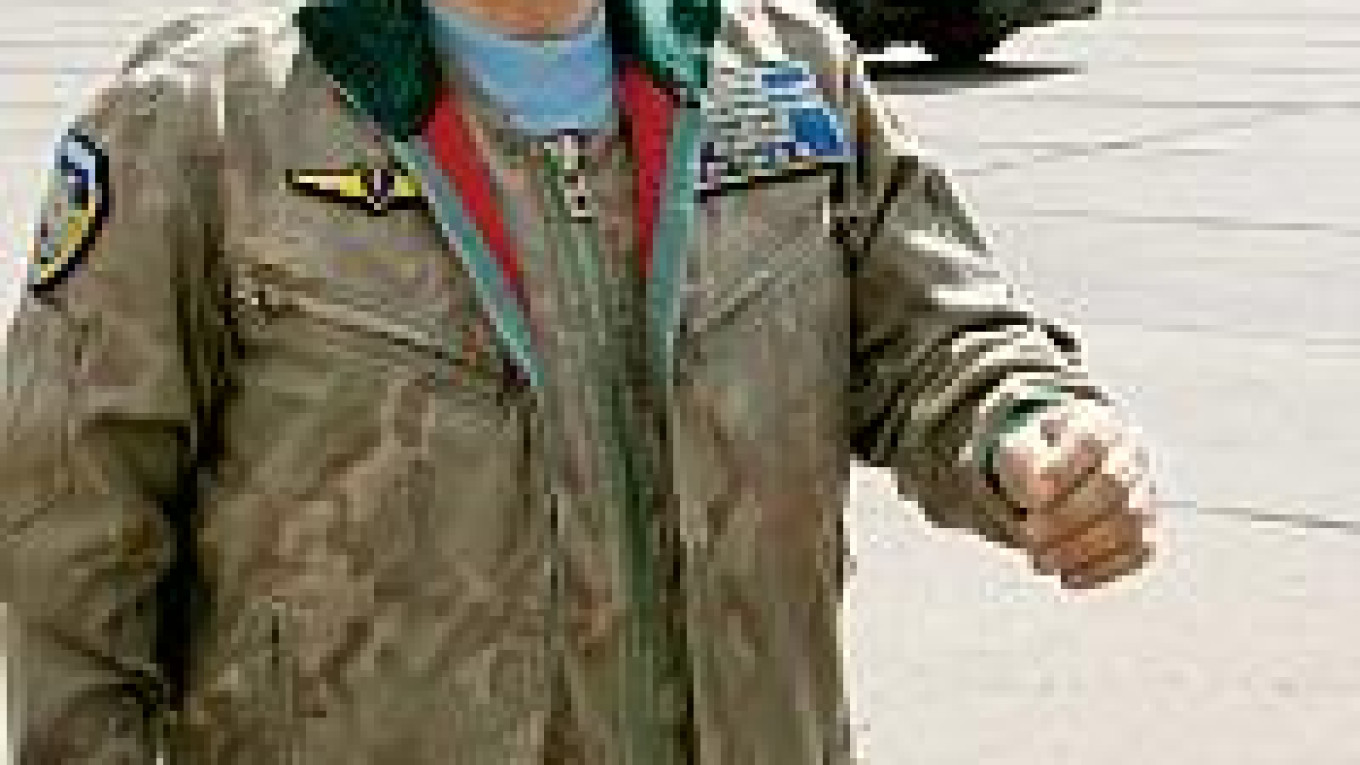After opening the MAKS 2005 air show at the Zhukovsky airfield, Putin was whisked to the Chkalovsky Air Force Base northeast of Moscow to board a waiting Tu-160 supersonic jet.
During a brief medical check shown on state television, a medical officer told Putin that his blood pressure was as good as a cosmonaut's. The 52-year-old president joked that he would not fly to space this time.
Putin, a retired security services colonel who has sailed in a submerged submarine and has flown to Chechnya in a two-seater Su-27 fighter, then attended a mission briefing by Igor Khvorov, the head of the strategic air command.
Putin sat in the commander's seat while Khvorov's deputy, Anatoly Zhikharev, piloted the 275-ton bomber, which can carry nuclear and conventional cruise missiles. Two navigators were also on board.
The plane, named Pavel Taran, broke the sound barrier over the Nizhny Novgorod region and then slowed down to fire a cruise missile at a target. An accompanying Tu-160 also fired a missile.
Khvorov, who piloted the second plane, said before takeoff that they would perform a daring low-level pass 200 meters above ground at a speed of 900 kilometers per hour, Interfax reported. Putin's Tu-160 was also to refuel in midair, Interfax reported.
Upon landing in Olenegorsk, in the Murmansk region, to attend the war game late Tuesday, Putin described the flight as a dream come true.
"I must say that it is a very pleasant feeling," he said on Channel One television. "I think it is similar to how you fly in a dream."
Putin said the planes had successfully fired new high-precision, long-range cruise missiles.
The war game, which entered its active phase Tuesday, is bringing together the Northern Fleet and the Air Force's long-range division. It is perhaps the most impressive of four exercises planned for August and September. An unprecedented Russian-Chinese exercise is to start Thursday in the Far East, and the U.S. State Department said Tuesday that it hoped the exercise would focus on strengthening stability in the region, Interfax reported.
Defense Minister Sergei Ivanov, Putin's close ally, also arrived in the Murmansk region on Tuesday to attend the war game.
The flagship of the Northern Fleet, the Pyotr Veliky cruiser, and Russia's sole aircraft carrier, the Admiral Kuznetsov, were already plowing the rough waters of the Barents Sea together with a group of smaller warships in preparation for a naval battle simulation planned for Wednesday, a Navy source told Interfax.
More significantly, two Delphin submarines carrying RSM-54 Sineva ballistic missiles will participate in Wednesday's maneuvers, Kommersant reported. One submarine was to fire a Sineva across the country to hit a range on the Kamchatka Peninsula, while the other would serve as a backup should the first launch fail, the newspaper said.
A nuclear submarine failed to launch a Sineva during a similar Northern Fleet war game attended by Putin in February 2004. A second Sineva was launched, but it had to be destroyed in flight after it veered off course.
The failures came as a major embarrassment for Navy chief Vladimir Kuroyedov, if not for Putin, who had reportedly once considered promoting Kuroyedov to defense minister.
Admiral Vladimir Masorin, the Navy's No. 2 commander and its chief of staff, is serving as acting commander of the Navy this week, Vremya Novostei reported. Should the planned Sineva launch go well, Masorin could replace Kuroyedov as Navy chief, Vremya Novostei and Kommersant said.
The Kremlin has already asked Masorin whether he would like the job, and he replied affirmatively, Vremya Novostei said.
Northern Fleet commander Mikhail Abramov might then be promoted to the post of Navy chief of staff, both newspapers said.
Once restrained in his public comments, Masorin has become outspoken, accusing the Pacific Fleet of negligence and irresponsibility in its aborted attempt to rescue the trapped mini-submarine earlier this month.
Kuroyedov is the longest-serving commander in any of the three branches of the armed forces. He was appointed as Navy chief by then-President Boris Yeltsin in 1997, but it was under Putin that his troubles began. First the Kursk submarine sank in 2000, killing all 118 sailors on board, and then a decommissioned K-159 submarine sank in 2003, killing nine sailors. The two disasters shattered the Navy's image, and nonstate media organizations have paid extra attention to all Navy accidents since then.
The final stage of the northern war game will see the Space Forces launch a Monitor-E satellite from Plesetsk Cosmodrome in northern Russia and a RS-20 ballistic missile from Baikonur Cosmodrome in Kazakhstan, Kommersant reported. According to the Federal Space Agency's web site, the RS-20 will launch a cluster of mini-satellites on Aug. 24, and the Monitor-E will be launched on Aug. 28.
The Tu-160, which along with the Tu-95 bomber is the backbone of the air-based component of the military's strategic nuclear triad, has a near-perfect safety record. One crashed in 2003, killing all four crew members.
A Message from The Moscow Times:
Dear readers,
We are facing unprecedented challenges. Russia's Prosecutor General's Office has designated The Moscow Times as an "undesirable" organization, criminalizing our work and putting our staff at risk of prosecution. This follows our earlier unjust labeling as a "foreign agent."
These actions are direct attempts to silence independent journalism in Russia. The authorities claim our work "discredits the decisions of the Russian leadership." We see things differently: we strive to provide accurate, unbiased reporting on Russia.
We, the journalists of The Moscow Times, refuse to be silenced. But to continue our work, we need your help.
Your support, no matter how small, makes a world of difference. If you can, please support us monthly starting from just $2. It's quick to set up, and every contribution makes a significant impact.
By supporting The Moscow Times, you're defending open, independent journalism in the face of repression. Thank you for standing with us.
Remind me later.


